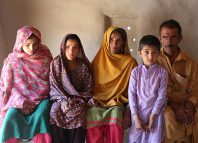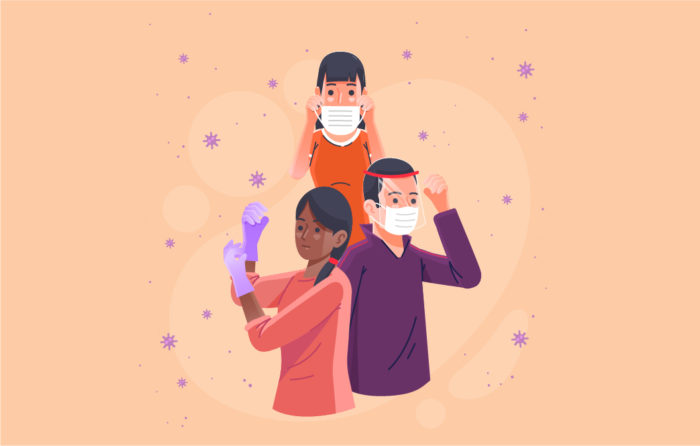Authored by Palwashay Arbab
Struggles of a working mom
At 2:40 AM on a Saturday night I begin to type down this journal that I had been meaning to write for many days now. The timing for a working mom of two children under 4 years is a bit out of the ordinary but I suffer from a creative block, writer’s block, attention block (if that even exists) any other time in the day these days. I wonder why, I ask myself? But the answer stares back at me hundreds of times a day in the eyes of my two very loveable children, Musa (4 years) and Mina (10 months). But that’s not the only reason.
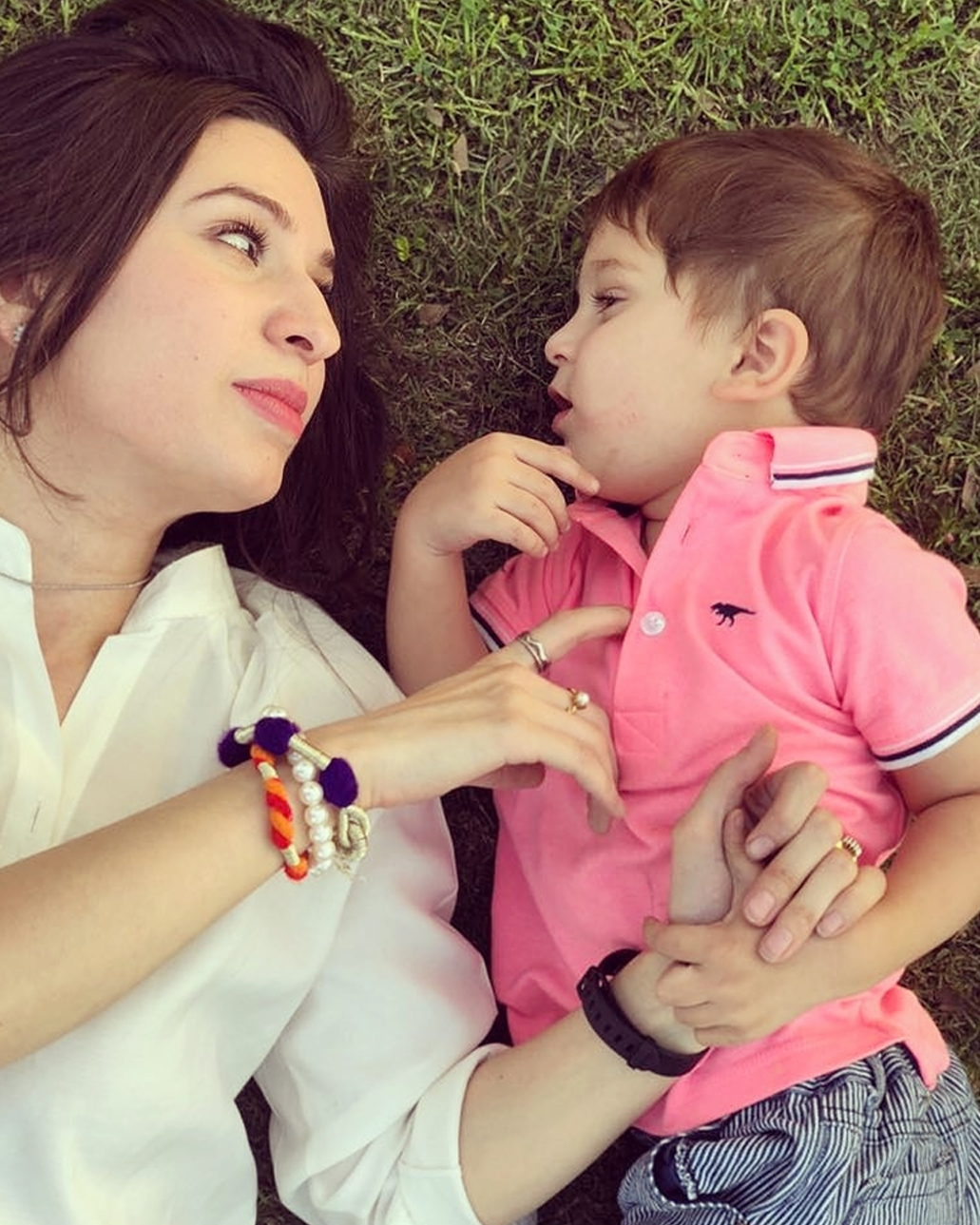
Three months ago, I was a full-time humanitarian/development worker and a round-the-clock mom, apart from all the other gender specific roles a typical South Asian married woman has to play. But now I am also a full-time cleaner, delivery-service provider, driver (if needed), house-wife, kindergarten teacher and part-time cook in addition to my paid job and my duties as a mother. Like many Pakistani couples, we also live in a joint-family system and I believe there are more pros to it than cons. However, since both my parents-in-law suffer from diabetes and cardiovascular complications, we have asked them to self-isolate at most times and I have to be extremely careful about what and who comes into our house. To be safe, my husband and I have taken it upon ourselves to make all the necessary grocery buying visits and have sent our support staff on paid leaves. My husband had to return back to work in another city after taking a month’s break because he must continue sustaining a large chunk of the family’s livelihood. I am not complaining, but I cannot deny the fact that three months into this rigorous routine has become rather overwhelming and physically and mentally exhausting.
My children have me (and only me) around at their disposal at all times, because of which they have become quite clingy and needy. They want and need my undivided attention. Whenever I sit down to work they remember to ask me for everything under the sun; “mama, make me a house from cushions. Mama, take me to the bathroom (even though Musa is quite capable of going to one on his own now); Mama, make me popsicles at home; Mama make me a farm in the lounge; Mama, you have to feed me yourself. Mama, let’s do painting.” And so on. Mina has to be checked 24/7 as she keeps stuffing her mouth with anything that comes her way and is a keen explorer of everything ‘hazardous’. I usually try to wake up earlier so that I complete my more ‘labour-intensive’ work assignments before they are up but the minute I step out of the room, they come waddling behind me like little ducklings following Mother Goose. And the same march goes on through the day.
It’s a glum situation for children as well and one cannot blame them for their dependency on their parents for entertainment and comfort since their own life has been tremendously disrupted. Schools are closed, they have no social life, outdoor physical activities have been halted, they have been restricted to spend much time with their grandparents and there is constant paranoia of the COVID-19 around them. Just instilling the fear of the ‘big bad corona virus germs’ so that they wash their hands frequently and keep their masks on even if they’re stepping out of the gate is unnatural and stressful for them. This is when all the helpful and insightful guidance on managing children during the crisis should be referred to and used. But to be honest, with managing all that’s on my plate, just remembering to refer to the guidelines and parenting tips becomes cumbersome and is often sidelined and I conveniently continue to carry on with whatever is working on a day to day basis for me. I reassure myself, “I am doing fine. And God will help me survive this.”
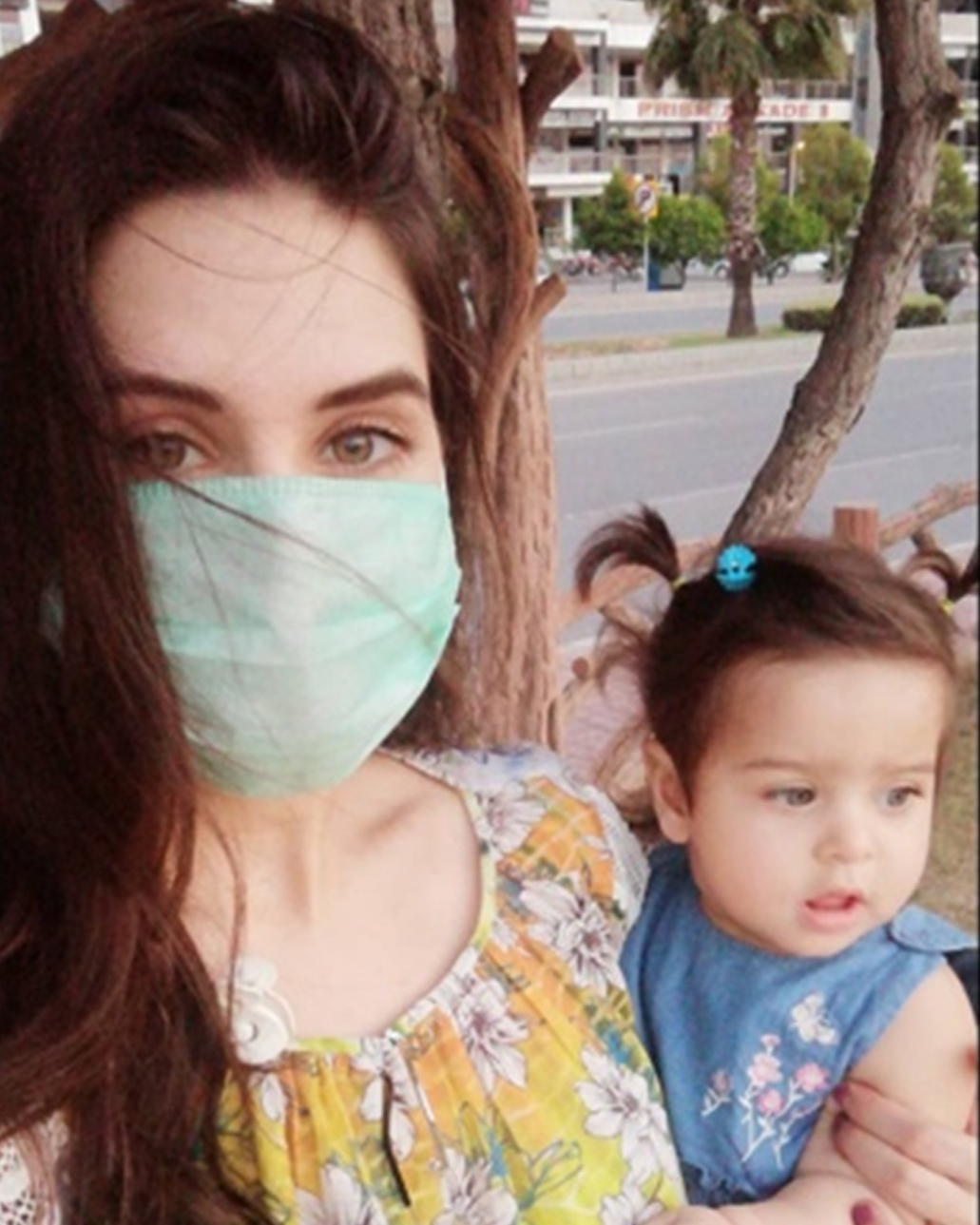
Reassurances aside, there are days when exhaustion, crippling fear, unwarranted stress, sleep deprivation and anxiety get the best of me. These are unprecedented times, and the usual coping measures we had aligned ourselves to are failing or simply unavailable to us. In the time before COVID-19, I used to seek solace and sanity in my work and the hours I spent at office. The quiet rooms, the productive work environment, the frequent coffee/tea chit chats with colleagues, the complete one-hour lunch breaks where all of us staff mingled and exchanged news and “lifestyle tips”, the celebrations, the physical meetings, trainings and the sheer ease of just going from one desk to another to discuss work or ask a question, was what I subconsciously relished. Casual visits to the mall, taking the children on play dates, meeting friends over late night tea and occasional dinners at restaurants were other recreational activities that we looked forward to on weekends and “refreshed” me for the usual tiring weekdays ahead. Today it seems I took it all for granted. “You never realise the value of something until it’s gone,” they say. This stands truer today than it could ever have.
Work has also become more taxing; there is a constant need of updating everyone with what you are doing and working on, there are more SoPs to follow, work plans, time sheets, activity calendars to draft and share, timelines becoming tougher, mandatory attendance in virtual meetings several times a week and generally an increase in workload. There is also this pressure of keeping your staff motivated and productive and eventually we are running out of ideas to sustain an ideal level of staff energy and morale. Its normal to have busier work days or months but the uncertainty that comes with a crisis of this nature makes it more challenging; not knowing when this will end and how long we would need to work or function this way?
Though I do pause and think to myself whether the workload has actually increased or it’s just the environment and other external factors that is making it more arduous? The global aid sector has largely been affected by the COVID-19 but in Pakistan and Afghanistan the brunt has been more severe since the region was already suffering from the impact of ‘shrinking humanitarian space’; funds for existing humanitarian and development programs have been suspended, implementation of projects is challenging as the country is going in and out of lockdowns, the virus is now hitting its peak and will continue (as forecasted) to affect huge populations in the countries. This has led to a rise in staff redundancies and aid and civil society organisations picking up their pace to survive this global crisis and sustain itself. In such circumstances, everyone is expected to bring on their “A Game” to help support the organisation endure this pandemic and preserve one’s own livelihood.
Despite all the adverse implications of the COVID-19, I consider myself privileged enough to still have my family and myself safe from the crisis, to be living in a comfortable house, have food on the table, clothes on my children, adequate facilities that support working from home, a gender-friendly employer that is flexible and accommodating, and a running income to ensure my financial stability and economic independence. But I will not be able to say the same for many other people, especially women, younger girls and children in this region who are affected by this crisis. Developing countries like Pakistan and Afghanistan, with already very low indicators of socio-economic development, an epidemic such as this one is likely to further compound pre-existing gender inequalities.
Is COVID-19 worsening inequality for women and girls?
![]() Mounting evidence from the global data suggests that ‘Violence Against Women’ particularly of domestic nature is tantamount to yet another ‘Public Health Crisis’ as domestic torture, abuse and insult serve to act like an additional infection. UN is calling it as a ‘Shadow Pandemic’ with serious consequences for the health, protection and safety of women[1]. Increases in gender-based violence during lockdowns threatens the lives and livelihoods of women and girls all over the world.
Mounting evidence from the global data suggests that ‘Violence Against Women’ particularly of domestic nature is tantamount to yet another ‘Public Health Crisis’ as domestic torture, abuse and insult serve to act like an additional infection. UN is calling it as a ‘Shadow Pandemic’ with serious consequences for the health, protection and safety of women[1]. Increases in gender-based violence during lockdowns threatens the lives and livelihoods of women and girls all over the world.
A new report by the UN Women reveals that the COVID-19 crisis has intensified gender inequality and gender discrimination around the world. Titled as “The First 100 Days of the Covid-19 Outbreak in Asia and the Pacific: A Gender Lens”, the Report confirms disproportionate impact of COVID-19 on women and girls. The report observes that lockdowns and quarantine measures placed by many countries mean that millions of women are confined with their abusers, with limited options for seeking help and support.
![]() COVID-19 has brought up a wide angle, panorama view of a problem that is persistent because it is ingrained in all our social, political, economic structures, and sheltered by deep-rooted patriarchal beliefs. These are beliefs and attitudes that are in line with the social gender norms, which, for example, establish that wives are properties of men and are morally obligated to support them emotionally, physically, socially and if need be, economically.
COVID-19 has brought up a wide angle, panorama view of a problem that is persistent because it is ingrained in all our social, political, economic structures, and sheltered by deep-rooted patriarchal beliefs. These are beliefs and attitudes that are in line with the social gender norms, which, for example, establish that wives are properties of men and are morally obligated to support them emotionally, physically, socially and if need be, economically.
Irrespective of the COVID 19 context, incidents of domestic violence have been occurring across Pakistan and Afghanistan at an alarming rate. While there is no official data of this nature related to the lockdown in the two countries yet, existing data on gender-based violence paints a grim picture. In Pakistan, mental health professionals providing online therapy sessions also report that they have seen a rise in the cases of domestic abuse in the wake of the COVID 19 lockdown in Pakistan. With 28% of women experiencing physical and sexual violence, another 25% experience emotional abuse which affects even the most empowered women[2].
![]() Moreover, despite the remarkable progress made by women over the past half-century or so, women’s position in the labour market remains very different from men’s. On average, employed women work shorter hours than employed men, earn less than employed men, and enjoy less seniority than employed men. Women’s labour market attachment tends to be weaker than men’s, especially around parenthood. Women’s job tenure is, on average, shorter than men’s[3]. And men and women continue to work in different sectors of the economy, with women’s employment often concentrated in the public sector and in the care and education sectors.
Moreover, despite the remarkable progress made by women over the past half-century or so, women’s position in the labour market remains very different from men’s. On average, employed women work shorter hours than employed men, earn less than employed men, and enjoy less seniority than employed men. Women’s labour market attachment tends to be weaker than men’s, especially around parenthood. Women’s job tenure is, on average, shorter than men’s[3]. And men and women continue to work in different sectors of the economy, with women’s employment often concentrated in the public sector and in the care and education sectors.
In the context of the COVID‑19 crisis, the fear is that gender employment gaps like these leave women more vulnerable than men to job loss; that women’s lesser status in the labour market leaves them more exposed and easier to lay off. These fears are particularly acute in many developing countries and emerging economies, where large numbers of women workers continue to work in “informal employment” – jobs that are often unregistered and that generally lack basic social or legal protection and employment benefits[4].
![]() The self-employed and small- and medium-sized enterprises (SMEs) are at the centre of the current crisis. While the scale of the economic challenge is still unfolding, it is likely that SMEs and the self-employed will be hit hard by supply-chain disruption in affected countries, and will be severely impacted by the longer term economic downturn.
The self-employed and small- and medium-sized enterprises (SMEs) are at the centre of the current crisis. While the scale of the economic challenge is still unfolding, it is likely that SMEs and the self-employed will be hit hard by supply-chain disruption in affected countries, and will be severely impacted by the longer term economic downturn.
Regardless of the gendered impact of job and business loss, women are likely to be more vulnerable than men to any crisis-driven loss of income. In most South Asian countries, women’s incomes are, on average, lower than men’s and their poverty rates are higher). Women also own less wealth than men, for a variety of reasons. And because of their greater caring responsibilities, it is often more difficult for women to find alternative employment and income streams following lay-off.
![]() According to Pakistan Development Update (World Bank) in 2017, Pakistan held the lowest rate of women entrepreneurship in the world, with only 1% of women being entrepreneurs compared to 21% of men. The COVID-19 led lockdown has resulted in further shrinking this one percent bracket of women entrepreneurs as most women led-businesses belong to the beauty, grooming, fashion, hospitality and food sector which has been hit more severely by the crisis. With deteriorating economic conditions, less buying power and the intimate nature of grooming, beauty, fashion and home-based food industry, COVID-19 has almost crushed women-led businesses, further decapitating their financial independence, household decision-making and pushed back all sorts of empowerment prospects. A latest survey (April 2020) by UN Women Asia Pacific states that 86% of women entrepreneurs are either negatively or very negatively affected by COVID-19, 75% of the entrepreneurs’ caregiving responsibilities have increased due to COVID-19, 77% women led business now sell less products / services and 34% state that they soon (might) have to close their operations entirely[5].
According to Pakistan Development Update (World Bank) in 2017, Pakistan held the lowest rate of women entrepreneurship in the world, with only 1% of women being entrepreneurs compared to 21% of men. The COVID-19 led lockdown has resulted in further shrinking this one percent bracket of women entrepreneurs as most women led-businesses belong to the beauty, grooming, fashion, hospitality and food sector which has been hit more severely by the crisis. With deteriorating economic conditions, less buying power and the intimate nature of grooming, beauty, fashion and home-based food industry, COVID-19 has almost crushed women-led businesses, further decapitating their financial independence, household decision-making and pushed back all sorts of empowerment prospects. A latest survey (April 2020) by UN Women Asia Pacific states that 86% of women entrepreneurs are either negatively or very negatively affected by COVID-19, 75% of the entrepreneurs’ caregiving responsibilities have increased due to COVID-19, 77% women led business now sell less products / services and 34% state that they soon (might) have to close their operations entirely[5].
Recognising that Covid-19 is affecting women and men differently can be a key for creating effective, equitable programme interventions and policies. Data also reveals that epidemics have inequitable effects on all vulnerable groups[6]. In the case of women, this can include: increased burden of unpaid care work, increased gender-based violence and social protection risks, increased vulnerability of women healthcare providers working on the frontlines, challenges in accessing necessary information, and reduced access to quality reproductive health and family planning services, as well as precarious employment.
Voices from HOME
Since I did not want this article to be biased and a mere rant of an exhausted mother, I spoke to a few other women from different spheres of life to get more insights and first-hand knowledge on their experiences during the on-going pandemic. In this part of the world, and maybe any other part of the world, home is where the woman is and this is why it’s very important to hear what women are experiencing as an impact on them will have a domino effect on the society at large.
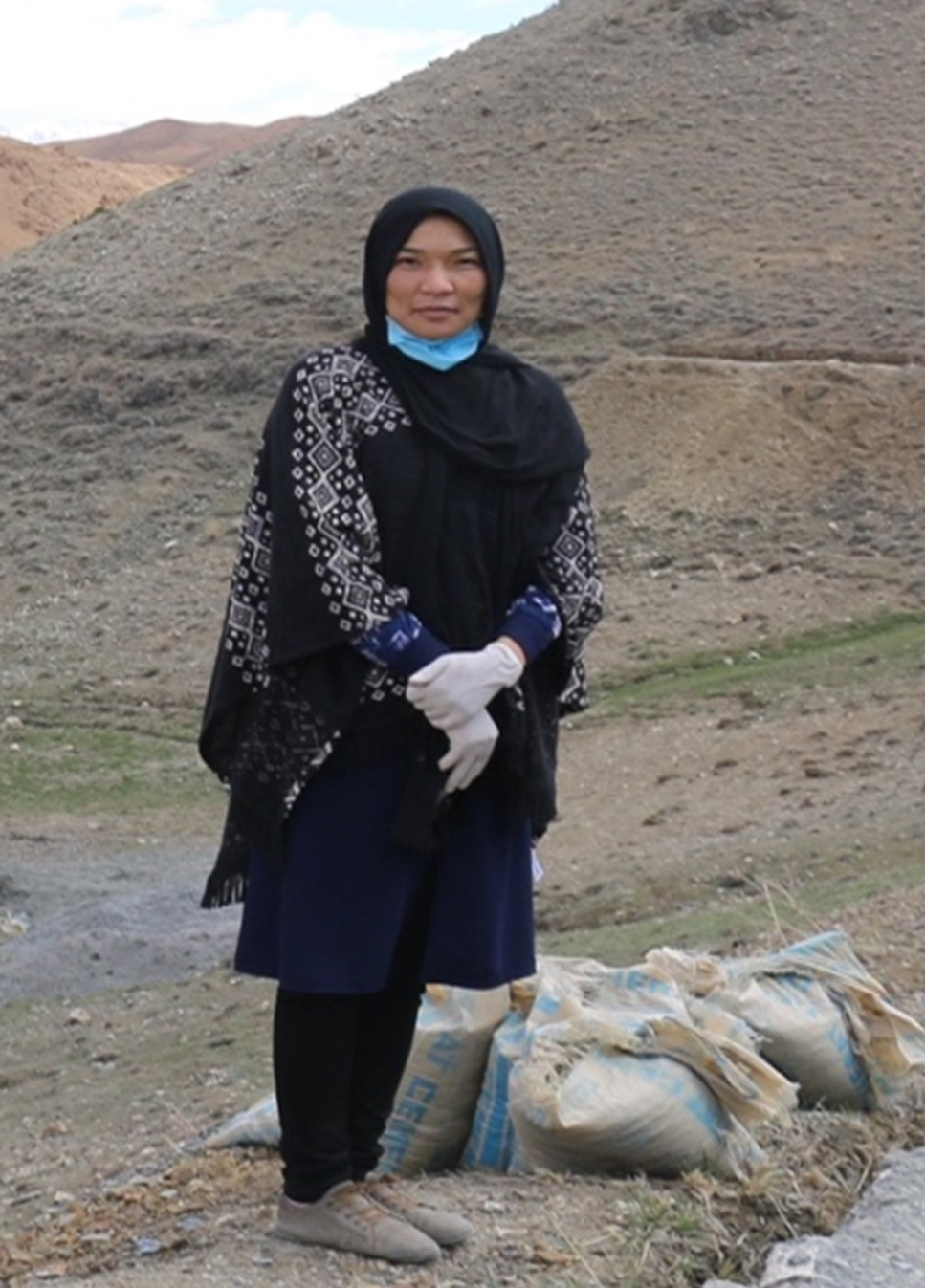 Razia Muradi, Humanitarian worker, Afghanistan
Razia Muradi, Humanitarian worker, Afghanistan
“During this COVID-19 pandemic, all of us are experiencing different things. We are facing some new challenges, but we have also achieved some successes and have learnt new things. It’s like every day is a new journey.
By the end of April, we were set to resume work on one of our drought response recovery project activities in Bamyan. At that time Bamyan was locked down due to COVID-19 and the number of corona positive cases were increasing day by day. Due to funds suspension and budget limitations, we were unable to retain some of our project staff. The difficult decision of contract closures had to be taken. Only a few project team members continued work on the project, including me. This meant that a few of us had to take up the workload of the entire project now. Workload increased a lot and it became very difficult to maintain a balance between our personal and professional life. As part of the project we had to conduct meetings with government directorates, and have field monitoring visits. Every day I was afraid of being infected by COVID-19 and transmitting the virus to my family members.
To protect my health and wellbeing I earnestly followed all official health measures and safety advice, but still, I was nervous and stressed. To reduce my stress and to freshen my mind, I started taking some time out every day to make myself feel better. I would talk to my friends, engage in some gardening, started taking walks and listening to music.
Besides all the challenges that have come with this pandemic, it has also provided me with some learning opportunities and brought me closer to technology and made me comfortable with the digital environment. I have been taking many online courses, training, and have participated in many virtual learning events which are helping me enhance my skills and knowledge.
Most importantly, this crisis has taught me about how uncertain life is. One cannot anticipate what will happen next as something as invisible as the virus has easily impacted us and our lives in such a big way. But the important point is to never be disappointed and always search for an alternative way; new challenges are always a sign for learning something new.”
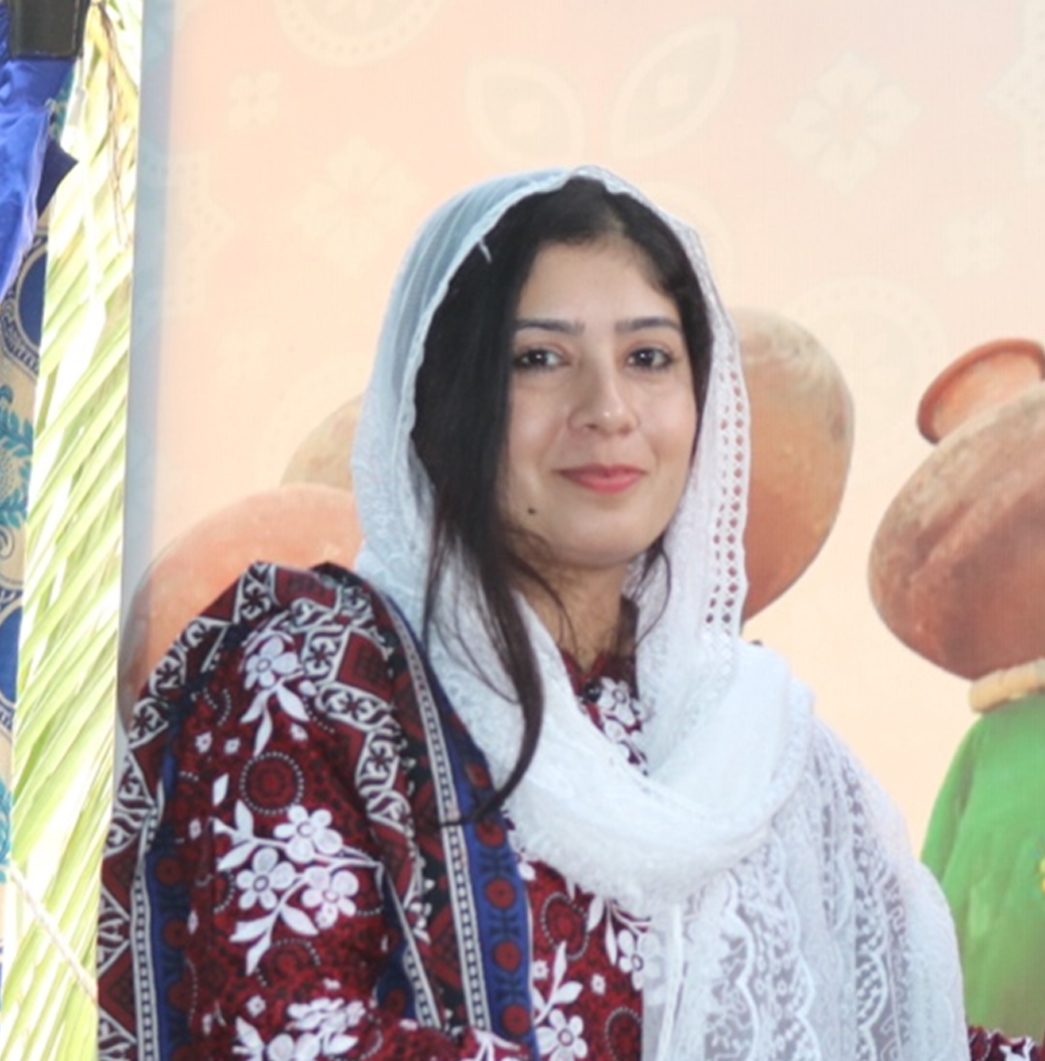 Kiran Bashir, Development Worker, Pakistan
Kiran Bashir, Development Worker, Pakistan
“My mental stress is increasing with the passage of time. At the start of this pandemic everyone assumed that it will end in a month or two at the most and we saw it as a short-term issue. However, this prolonged duration of the crisis is now getting increasingly challenging.
I have started questioning my emotional and physical capabilities because I have to manage and maintain the morale of my team while remotely managing all the projects. With all our projects focused in rural communities and personally based in rural Sindh, network and access issues are posing huge problems. Internet connectivity is a major issue and communicating has become challenging. This anxiety gets further aggravated when we have to conduct or attend webinars and virtual meetings with whatever little internet connectivity we have.
Many compromises have to made on the quality of project interventions as physical follow up and monitoring in field is not possible due to security and safety issues. Just thinking about that makes, me nervous and starts affecting my physical and psychological well-being. This helplessness and subsequent stress further increases when I think about how helpless the most vulnerable and poverty-stricken communities in this area are. They have lost livelihoods, barely have access to medical facilities and food. All nearby markets are closed down and public transports has also been halted. However, the ultimate goal is to be safe so we are all learning to compromise on all these others things and instead trying to manage these negative feelings in positive way.
Being a working woman and engaged in the development sector, I always encourage women in my community and the rural region to contribute actively in their own socio-economic empowerment but due to the circumstances arisen by the COVID-19, I am focusing on guiding women to be patient and not to panic. I try to provide them virtual support if they are facing any domestic, mental or physical violence in their homes as stress levels have risen rapidly and these women have to address many issues at a time.
In country a like Pakistan where family bindings are so strong and people do not have separate and proper places to sit and work in the house, it becomes very challenging to work from home. Managing your career and household responsibilities in a balanced way is almost impossible. I feel I’m struggling to meet both the quantity and quality of my work.
As the COVID-19 crisis unfolds, the lives of women and girls everywhere are changing.
While some spheres of work and personal life are on pause, others face increased strains and new challenges.
Working in an office environment meant that we had many chances to learn from colleagues and senior team members whereas these chances have become very limited while working in isolation. Furthermore, it is difficult to practice and prove your accomplishments and capabilities in such working conditions. In short, current working conditions are obstructing the performance and growth of many women professionals like me and millions of other women worldwide who are part of the essential workforce and are on the front lines of COVID-19.”
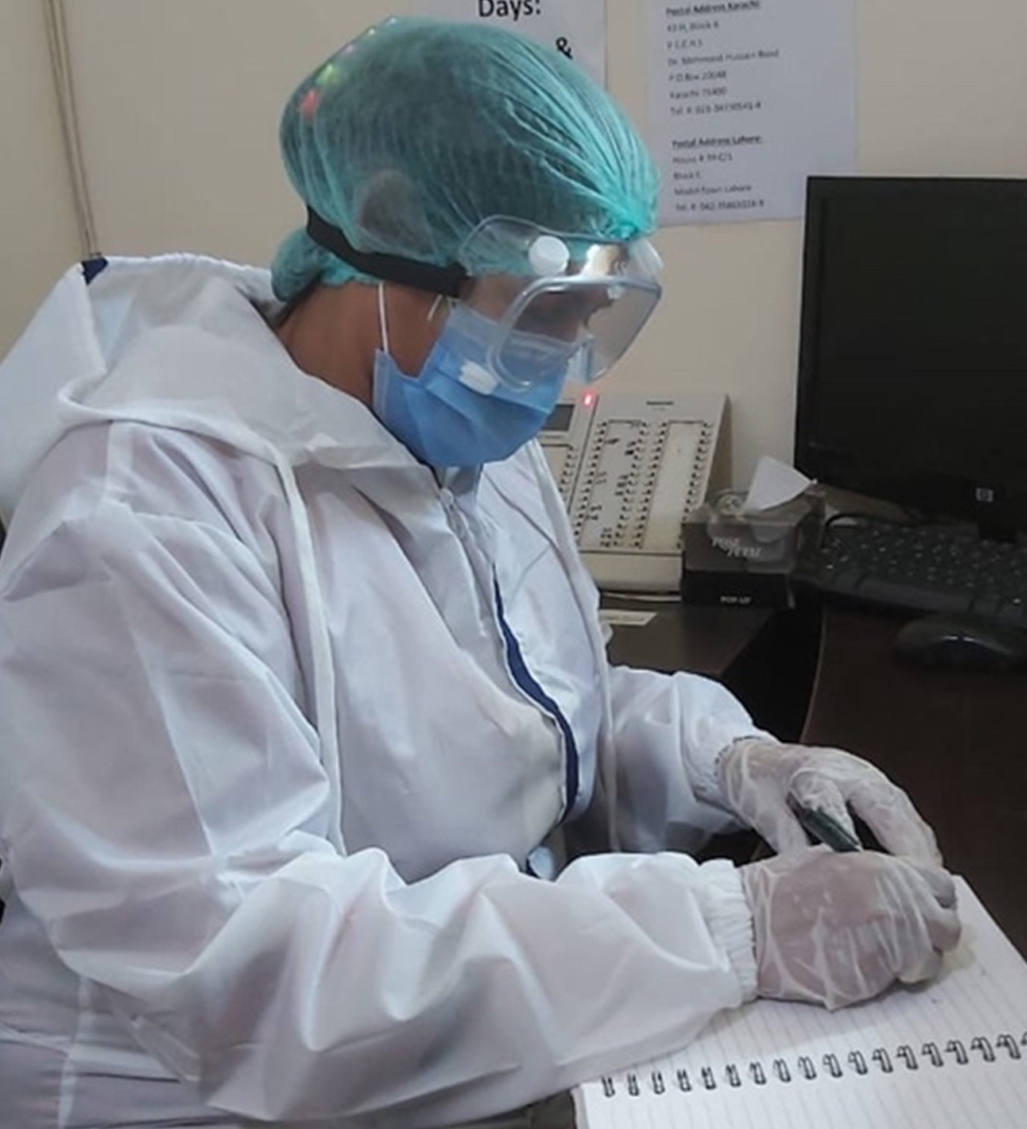 Farhat Shamim, Driver, Pakistan
Farhat Shamim, Driver, Pakistan
“I was married off when I was only 13 years old. My husband passed away three years later as he was struck by an electric shock. So, I became a widowed mother of two young boys at the age of 16. I had only passed with my matriculation when I got married so I did not hold any advanced academic degrees and had absolutely no source of income. It was the most difficult time of my life. My husband died suddenly and I had no financial support. Though my family members and in-laws supported me during this difficult time, I did not want to depend on them forever and wanted to be support my sons independently in the best way possible. With only my matriculation degree in hand, I started taking up various jobs when I was 17 years old. I worked as a teacher, as an administration staff and a librarian at public schools. Along with these jobs and being a full-time mother to my boys, I started pursuing my higher studies and finally earned a Master’s degree in Library and Information sciences in 2014.
With whatever little income I had, I ensured that my sons attended school and were well educated. They are both currently acquiring their undergraduate degrees at a university. I slowly built my way forward for myself and my children.
In February 2020, Farhat joined a private organisation as their first ever woman driver. It was a big achievement and a breakaway from many social and cultural taboos in our community. I was paid a fair salary. Unfortunately, as soon as the COVID-19 pandemic hit the country, I was laid off as the organisation was closing down and suffering losses. The stresses of my life returned with the pandemic. There was no source of income for us. My kitchen stopped working. I had no money to buy food supplies.
One of the women staff members at the organisation generously donated food rations for my kitchen but that alone was not enough to improve our economic conditions.
Since all academic institutions were closed during the COVID-19 imposed lockdown, both my sons were staying home and not attending university either. Their university has not initiated any online classes yet but the faculty is currently working on figuring out a mechanism to resume studies and will inform students soon. I hope they do, as I do not want my sons to waste time and lose out on education. Both of them are keeping themselves busy with indoor games, watching movies, reading and being up all night and sleeping in the day. It is not a healthy routine but at least they are home and that relaxes me because I know they are safe.
It is difficult for a woman like me to stay at home and do nothing, especially since I started working from a young age to support my children. I have three other sisters and we used to meet often before, but now I haven’t met any of them since the lockdown. I go to visit my mother sometimes when she is unwell but that’s it. When we meet with our family and friends, our minds feel fresh and we feel happy. However, this lockdown has ended that. There is stress and frustration. People are eager to live a normal life like they did in 2019.
I guess God heard my prayers because the organisation that I worked with as a driver recruited me back in May. Instead of driving, I now manage their office administration tasks and reception duties. For this I am being paid half of what I was paid before but I am grateful for this as it has my kitchen running at least. I am just worried about paying my sons’ tuition fees which is expected in the near future.
Every day I am praying for this situation to get better so that the working conditions improve and salary scales return to normal. It is difficult for people like us who struggle every day to put food on the table and manage our homes.
With the increasing cases of COVID in Pakistan, there seems to be no going back to normal soon. Professional and personal growth has and will come to a further halt. This worries me as I am the sole bread earner in my family. The fees of universities are quite high and for my children to gain the best education for their better future, I need to find ways to cover the education expenses. That is my main priority.
There have been times when I have considered ending my life and that of my children as I get tired of the constant struggles and hurdles in my life. I feel weak but Allah has helped me a lot. Such negative feelings go away as soon as I look at my sons. I think of the good future they will have if I provide them with education and a healthy upbringing and how they will be my pillars of support in my old age. This motivates me enough to carry on and get up every morning with new energy and positive vibes.
I feel you have to stay true to yourself and others. There are different struggles for everyone but these struggles end one day which always lead to new beginnings and better days. You have to stay strong and honest to yourself to overcome all the challenges in life.”
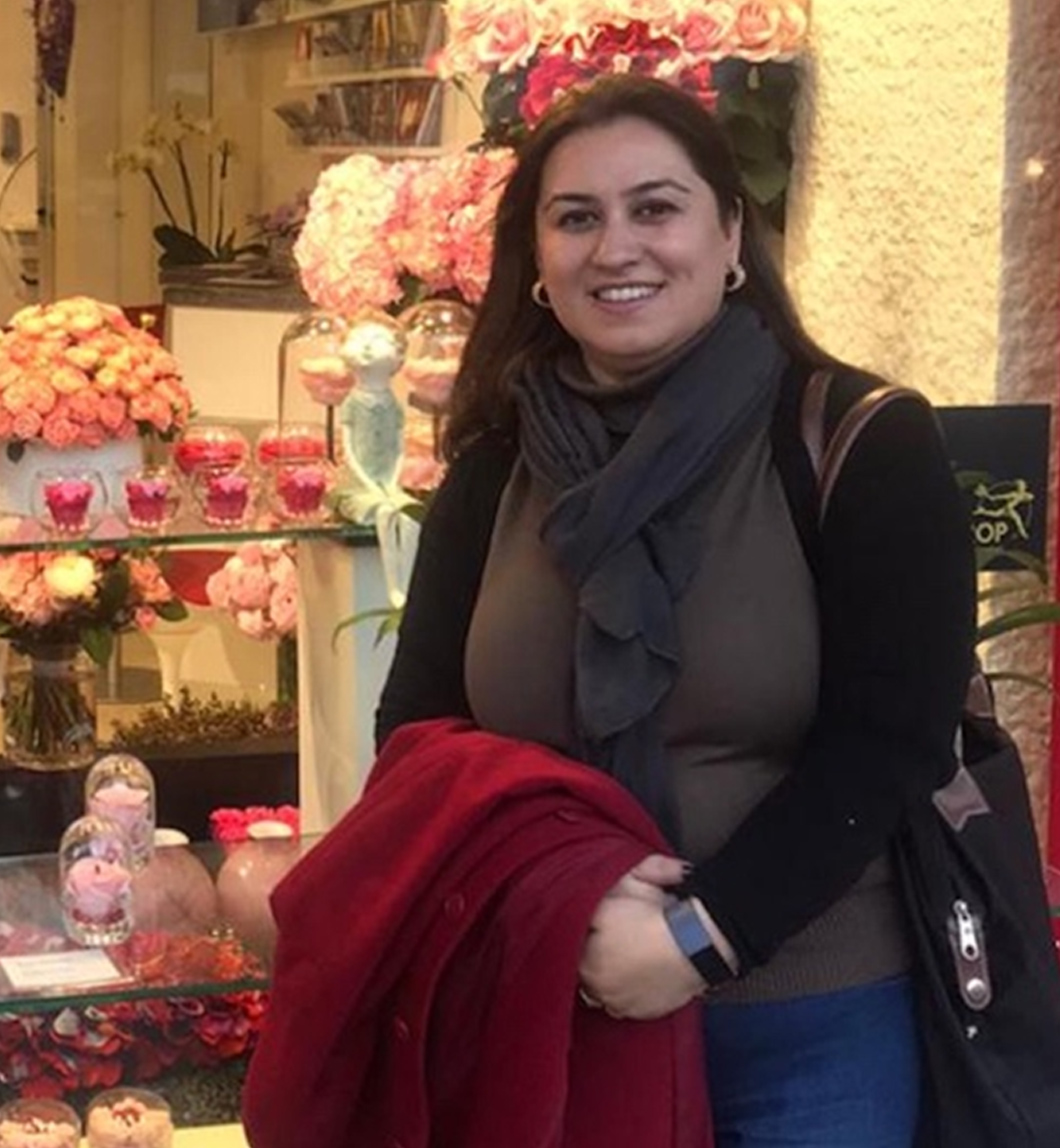 Rabia Sabri, Humanitarian Worker and Entrepreneur, Afghanistan
Rabia Sabri, Humanitarian Worker and Entrepreneur, Afghanistan
“Coming from a country (Afghanistan) which has seen a war, I have seen how quiet it can become. With the country being in a state of war, we could still understand the stillness and the silence in the cities. But the isolation and silence due to something like this (COVID-19 pandemic) is something I never ever experienced and found nerve-racking. You know everything around you is ok, but you’re still in a state of emergency. And I could not understand this or comprehend what was going on around me. It’s been very scary, sometimes I have felt as I if being in a horror movie. It has been very mentally disturbing.
Talking from a woman’s perspective, I feel we are the most affected population segment. Our responsibilities have doubled. We have become teachers, housewives, cleaner and whatever one can think of. I just think I’m very exhausted.
Initially when COVID-19 hit the country and the lockdowns were imposed I was very lost. I just didn’t know where to start from and how to manage everything sitting at home and working on a computer only. This was a very new concept for me because I never liked working from home because I find it very stressful, especially if you have children. You cannot concentrate on work the way you would at office because everyone needs your attention at home and would come and talk to you when you are in the middle of an assignment. You just lose your concentration and work flow.
Balancing work and home was a big challenge for me in the beginning. If I started working I would continue sitting with my laptop until I would complete that task, but in that process the children would miss out on their lunch, dinner or homework. The house would be left in a mess. We didn’t have any household help either because everyone was sent home due to the risk of the virus spreading. It was a particularly stressful time. There was a lot of fear of stepping out of the house. When I would go out and see all shops closed and no human on the street, with life coming to a standstill, that sight itself would trigger fear and stress within me.
Another stress trigger was the children. Understanding and being careful about how to handle them and how to manage their fears of the pandemic was something entirely new. The children have their own understanding of the situation and you do not want to scare them too much but you also want them to be careful so how does one manage that? They also had to get used to online classes which was again very new to all of us, them and us, the parents. As a mother it was again my responsibility to make sure they were attending these virtual classes and I was worried if they were actually learning through those or not. This was overwhelming as well. It was specifically difficult for my son, who is the youngest. It is still very challenging to make him sit through the class on the computer and make him work on his work sheets. For the teachers this is also something new so they are not well-trained on conducting online classes and ensuring children’s interest or participation which is affecting the children and stressing them out too.
The COVID-19 has affected our entire lives. It also affected my own small business.
A few years ago, I started a catering business from home. I used to provide home-cooked food on take-away and delivery basis to offices, birthday parties, social gatherings and household consumption. The business primarily had a social media presence and I marketed and operated it mainly through that. Once the pandemic hit the country, I was confused whether to continue with that business or stop it for a while. I was not sure if people would be comfortable ordering food from businesses like mine. While I was pondering over that I realized I could not continue as I was already struggling with meeting my workload from office and household duties. For safety reasons, I also had to send off all my kitchen support staff so I had to shut down the business eventually. It put a lot of pressure on us financially as it was an extra earning for our family but it was the only choice I had. I felt bad for the staff who were employed to run the business with me so I paid them for three months from the savings we made through our food services. I decided I would call the staff back if the situation improves and I could reopen the catering business but I haven’t resumed business as of yet. I have catered to some small orders for my friends or colleagues on my own, whenever I could manage but that’s about it.
Losing my business has been heart-breaking as I always dreamt to see my business flourishing. I really enjoyed it and it was something that made me happy. Such a long break in the business is not good either because it takes time and effort to build a certain clientele and reputation. I had worked very hard on training the staff working with me too. I am not sure if I will be able to build back again. I will have to start from scratch after this pandemic- to rebuild a repertoire with the customers, find new staff if the older ones do not return, train them again, market my business again.
 Our lives have changed overnight. Along with all the negatives, we also need to learn from this pandemic. I tell my children to write about this in a diary, record their experiences as this pandemic will go down in history and they will be part of that. I keep reminding them and myself that this will pass and is not permanent. I feel we took life for granted, we did not realise how much freedom we had; we did whatever we liked, we went to watch a movie, we went to the restaurant whenever we liked. Our freedom has been taken away and maybe for a reason. We were bored with everything, nothing really meant much. But now we know what it meant, whether it was a movie night out or a meal at a restaurant with family and friends. The human connection that we took for granted is something we miss very much now. I miss my relatives, I miss meeting my friends, I miss attending weddings. These things remind us that we should always cherish what we have.
Our lives have changed overnight. Along with all the negatives, we also need to learn from this pandemic. I tell my children to write about this in a diary, record their experiences as this pandemic will go down in history and they will be part of that. I keep reminding them and myself that this will pass and is not permanent. I feel we took life for granted, we did not realise how much freedom we had; we did whatever we liked, we went to watch a movie, we went to the restaurant whenever we liked. Our freedom has been taken away and maybe for a reason. We were bored with everything, nothing really meant much. But now we know what it meant, whether it was a movie night out or a meal at a restaurant with family and friends. The human connection that we took for granted is something we miss very much now. I miss my relatives, I miss meeting my friends, I miss attending weddings. These things remind us that we should always cherish what we have.
I have also realised that we were spending too much time on unnecessary things and overwhelming ourselves with too many tasks. It has helped me spend more time with my family. I have gotten to spend more time with my daughters. I am teaching them to cook a few of my signature dishes and we are all learning German language through a phone app together. It is very important to look at the positive side. There are days when I feel my life has finished but I am trying to be positive, keeping myself busy, engaging in productive activities and hoping for life to be normal again.
Though one important lesson for me from this pandemic is that we cannot home-school children. At least it’s something I cannot do. The environment at schools and the teaching, attention and socialization provided by teachers is what they need to continue to have a healthy life and a good education.”
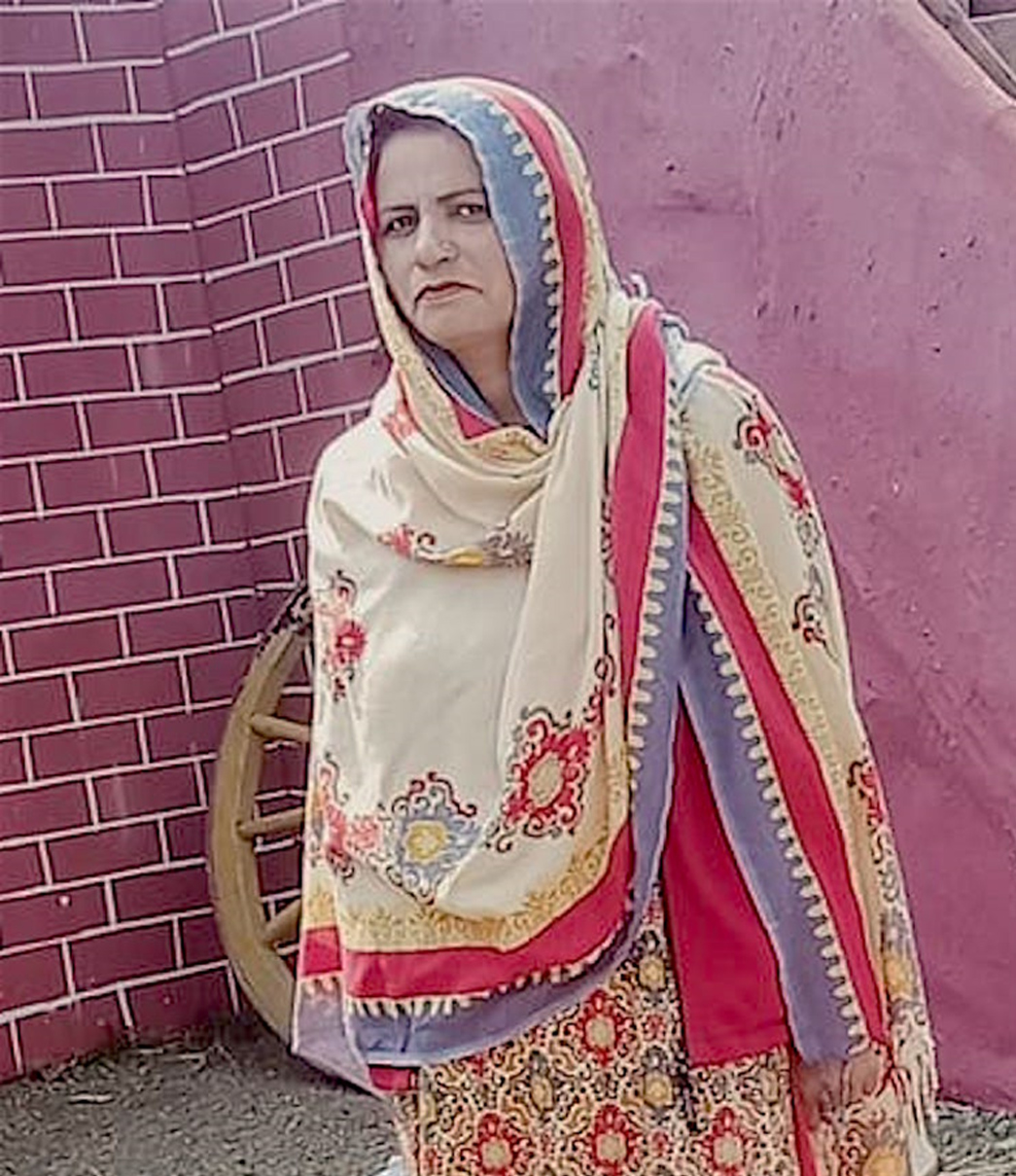 Sonia Sultan, Household Domestic Worker, Pakistan
Sonia Sultan, Household Domestic Worker, Pakistan
“I am 49 years old and a mother of five children. My husband is a house painter but he had an accident many years ago because of which one of his legs is impaired. He now works occasionally on a daily wage whenever he can find a job. I was working as a household maid, helping with cooking, cleaning and babysitting and would receive a monthly salary of PKR 20,000.
I have two daughters and three sons. Both my daughters are elder, one is married and the other is 20 years old and is working as a professional chef. She dropped out of school many years ago to help earn an income for the family as my husband’s occasional income and my meagre salary was insufficient to fulfill the needs of a family of seven members. Both my daughters worked and helped us earn an income through our most difficult times. My daughter, the chef, is also now contributing to paying for my sons’ school fees. My younger sons are 13 and 14 years old and my elder son who is 18years old just started interning at a men’s saloon when the COVID-19 struck and is now jobless.
Since the corona virus has struck our country my daughter and I have lost our jobs. We were both working for 8 hours a day at a house in a gated housing society in Lahore. But as the government imposed a lockdown, the housing society has been quarantined, restricting all and any domestic workers to enter or exit. As the construction industry has come to a standstill as well, my husband has lost even the few job opportunities that he had and has no income either.
Barely making ends meet, we have not even paid our house rent for two months. Providing a decent meal on the table for our four children has also become a day to day issue. My younger sons are disturbed as there is no school. Their school had asked us to buy books for them to study at home but we cannot afford buying books or stationary at this time. My eldest son is also just at home and sitting useless making ticktok videos the whole day. I get worried looking at him.
I am currently running the house and managing our most basic expenses with some money we had saved for our daughter’s wedding. Right now, surviving and making ends meet is our priority.
My household chores have almost doubled since the crisis. The children are home all day, they want food and clean clothes and they make a mess too. None of them help me, except my daughter, at times. My husband is making no effort either. He has conveniently let me shoulder all the worries on my own. In fact, he is making things more difficult as he is not allowing my daughter or me to take up a full-time job (meaning day and night) which will ease our worries and improve our financial situation. At this time of COVID19, most families are demanding for full-time support staff so that there is less risk of the virus entering their homes through the daily commute of domestic workers. Such opportunities are available to us but he won’t allow it so we cannot consider it.
I feel like I am suffering from depression. I am thinking of the uncertainty that lies ahead all day and night. It is difficult to sleep and my health is deteriorating. Thinking about the children and their future depresses me. Our future seems very bleak. I do not know how we will survive the coming months. We do not even know whether we will be able to negotiate more delays in rent payment or not.”
[1] https://www.unodc.org/documents/pakistan//Advocacy_Brief_4_Gender_-COVID-19-Punjab.pdf
[2]. Gender and Pandemic URGENT CALL FOR ACTION – UNODC Pakistan Advocacy Paper Brief 4
[3] OECD- Women at the core of the fight against COVID-19 crisis
[4] OECD- Women at the core of the fight against COVID-19 crisis
[5] %s based on participants surveyed in the Asia Pacific region. ASIA-PACIFIC NEEDS ASSESSMENT FOR MORE GENDER-INCLUSIVE ENTREPRENEURSHIP – HIGHTLIGHTS ON IMPACTS FROM COVID-19
[6] ‘Gender and Virus’ by Dr. Farzana Bari, The News, 12 April 2020




